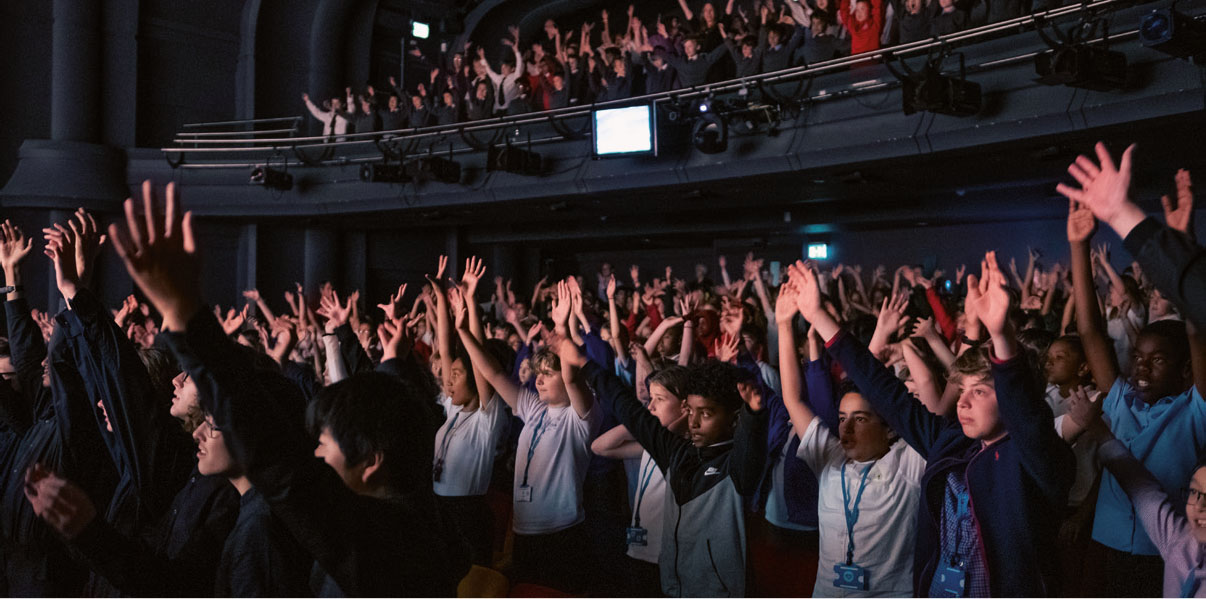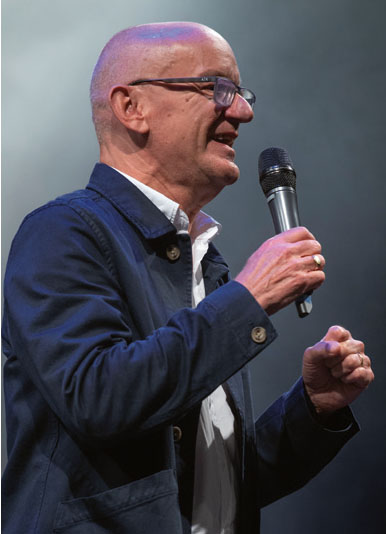
Forget Happy Feet, there is a new musical bird on the scene. Swap out penguins for swallows (and remove the tap dancing completely), and you are close to this new feathery creation from much-loved British composer Bob Chilcott and skilled writer Charles Bennett. The colourful new production, Birdland, tells the tale of a bird who can't sing, delving into themes of identity and the importance of self-confidence.
The new musical drama was commissioned by Magdalen College School (MCS) for the Oxford Festival of Music in collaboration with the Norfolk Music Hub and Young Artists Norfolk. The premiere initially had a much larger scope and was set to be performed by MCS students in the lead roles and including students from across Oxfordshire, with 250 performers singing in each performance. Then, Covid halted all these plans. Finally, at the end of June 2022, the project was revisited on a slightly smaller scale, premiering at the Oxford Playhouse with a bang, highlighting what can be done with effective partnership work and access to high-quality resources. At the Music Teachers’ Association Conference in Oxford, the school also presented a snippet of Birdland; by all accounts the performance was flawless.
Winging it in the wake of Covid
The show involved a collaboration with seven primary schools from the local area, involving nearly 400 school children. Due to existing pandemic regulations, the students could not take part on stage, so they remained in the audience area and sang along with the production. Chilcott visited several of the schools involved and worked with them closely.
The Birdland score was created with young singers in mind, says the composer, who included ‘lots of melody that is easy to learn and retain’. The show also has a lot of potential for a strong chorus as there are a number of significant choral songs, demonstrating the love Chilcott has for the ‘collective’, as he puts it. One challenge the composer had was transferring the power of the collective onto the stage, without the need for complex staging or collaborating with a director or choreographer at a writing stage. ‘My intention was to make it a kind of “portable” show that could be done in very simple ways, or in very elaborate ways, depending on who is wanting to do it,’ says Chilcott.
 Primary schools performing in Birdland
Primary schools performing in Birdland
The story
The plot follows a bird called Pip the Sparrow, who can't sing, and his mission to join the Dawn Chorus. Pip goes through a sequence of events to change his predicament, selling his soul to Doc Rock Peacocks and meeting the troubled residents of The Bewilderness. With the help of two friendly owls, Pip meets an amazing singer, the Golden Nightingale, who he reveres. It turns out that the Golden Nightingale has sold their soul too, and they release each other from the spell by working together. Ultimately, Pip leads the Dawn Chorus but, as Chilcott tells me, ‘The whole piece is really about finding and loving who you are and having faith in yourself to listen to the voice within you.’ Birdland explores themes of inclusivity and self-belief in a heart-warming testament to the healing power of music. With a variety of solo roles, singable melodies, and characterful orchestration, the production is flexible and lends itself to ‘host’ schools who can partner with music hubs and local primary schools. ‘My hope is that we can engage schools who have the potential to reach out to other groups and schools with the production. I think that's such a great model, and we have the perfect opportunity to do that here,’ says Chilcott.
This model reflects what is outlined in the refreshed National Plan for Music Education, which encourages stronger links between schools and sets out an updated hub programme that supports more peer-to-peer learning opportunities. The hubs and selected Lead Schools should work together to formulate ‘effective support programmes’, says the Plan, including ‘collaborative music projects with young people which involve teams of schools’.

Open casting
For a renowned composer usually associated with choral music, writing a musical for young people seems like quite a shift. Chilcott says that the project has been on the cards for over 15 years. Despite their increasingly busy schedules, Chilcott and Bennet were finally able to turn it into a reality in 2019.
All the roles in the production are gender free and are interchangeable, says Chilcott. ‘In classical music, the music can be very restrictive in terms of which gender can sing which part. I love the idea that any character can be any gender, and in many ways, it is nice to see more flexible ways of doing music,’ he says. Despite being logistically challenging in its creation, Chilcott has written the score so that a range of voices can play each character and all young people can play all roles, making the production's message of self-identity and community all the more poignant.
‘We are part of the discourse around engaging all types of people,’ says the composer. ‘That is one of the most important things we must do, and with the power of music, why shouldn't we? We all have a responsibility to change things when it comes to education; we must address some of the messages we project and what we are trying to tell younger generations.’ In all his years of working with young people, Chilcott says he has never met an individual who can't be engaged in music, and that has spurred him on to share it with as many students as possible.
Taking flight
‘The performance to primary schools was genuinely magical,’ says Alex Thomas, director of drama at MCS and director of the premiere at Oxford Playhouse (see his article on p.52). ‘Seeing the faces of hundreds of young children as they watched and joined in with the show was so uplifting; many had never set foot in a theatre before, so they were completely overawed by the spectacle and excitement of a live theatre performance, which was a brilliant outcome.’
Thomas believes that this sort of collaboration can be done on any level and scale, saying: ‘Although we were hugely lucky to be able to use Oxford Playhouse for the premiere, it would work very well in a school hall. Our sixth formers benefitted just as much from the collaboration as our visiting primary school pupils, learning how to teach songs and inspire young children.’ MCS performed with an amazing set, outfits, and live music, but, as Chilcott alluded to, the production could easily be staged without such extensive resources, and the songs could be used independently.
Leaving the nest
Chilcott says that his favourite part of the process was when he saw his vision come to life in the first rehearsal, and the joy that the show gave to younger students who may not have seen or heard anything like it before. Despite this being the first time Birdland has been produced and performed, the team behind it hope its reach will grow with every production.
‘Birdland is something that a lot of people can do as a group, while also establishing self-identity, and that appeals to me hugely,’ says Chilcott. Just as Pip yearns to join the Dawn Chorus, students are drawn to make music together when given the right opportunity, and Birdland is a brilliant show that can enable just that.
Birdland includes a rehearsal pack and access to a companion website with downloadable audio rehearsal tracks.
global.oup.com/academic/product/birdland-9780193523005?cc=gb&lang=en&








